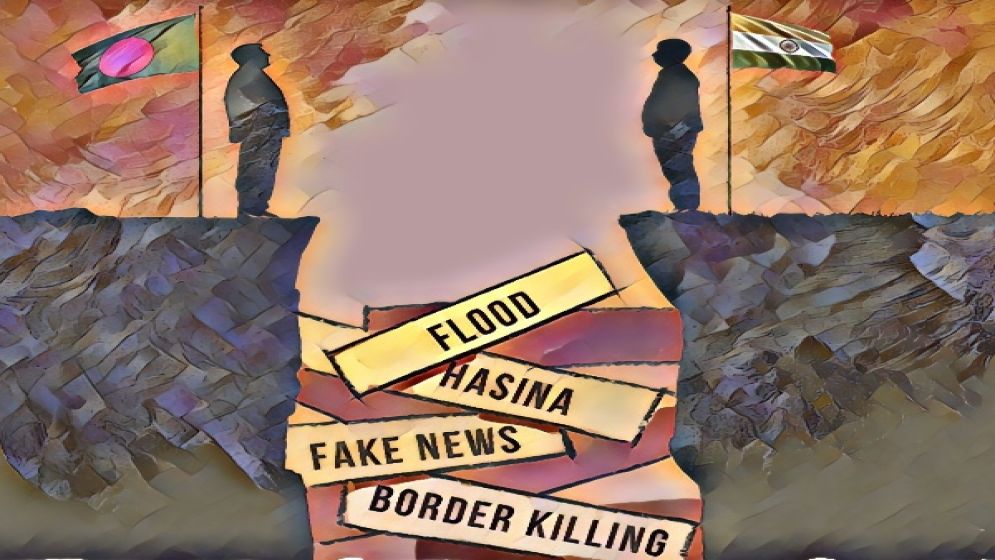
Shrabony Akter
The bedrock of international relations, the sanctity of state sovereignty, has once again been callously violated.
While history is rife with powerful nations cloaking their interventions in weaker states with lofty rhetoric, the modern world order, enshrined in the UN Charter, explicitly forbids such transgressions.
Yet, recent events in India expose a deeply troubling disregard for these fundamental principles.
On December 2nd, 2024, a mob associated with the Hindu Sangharsh Samiti stormed the Bangladesh Assistant High Commission in Agartala, India.
They desecrated the Bangladeshi flag and reportedly assaulted officials, all while Indian law enforcement stood idly by. This outrage followed a similar incident at the Bangladeshi Consulate in Kolkata just days prior.
These are not mere acts of vandalism; they are calculated assaults on Bangladesh’s sovereignty. Diplomatic missions are inviolable extensions of a nation’s sovereign territory. To attack them is to attack Bangladesh itself.
India’s failure to prevent these acts, and the disturbing inaction of its police force, raise serious questions about its commitment to international law and its respect for its neighbor.
This pattern of aggression, coupled with the rising tide of anti-Bangladesh disinformation in the Indian media, paints a worrisome picture. India has long portrayed itself as a friend and ally of Bangladesh.
But can true friendship exist when fundamental principles of respect and sovereignty are so blatantly disregarded?
India’s dangerous disregard for diplomatic norms
The troubling fact is that the recent attacks on Bangladeshi diplomatic missions in India represent a flagrant violation of several international laws and a profound breach of trust.
The Vienna Conventions on Diplomatic and Consular Relations, cornerstones of modern diplomacy, place a clear obligation on host nations to protect diplomatic personnel and premises.
India, by failing to prevent these attacks and ensure the safety of Bangladeshi officials, has fallen woefully short of its responsibilities.
Article 22 of the Vienna Convention on Diplomatic Relations mandates that host governments protect diplomatic missions within their territory. Similarly, the Vienna Convention on Consular Relations requires the host state to ensure the safety and dignity of consular personnel.
Furthermore, Article 31 of the Consular Relations Convention explicitly obligates the host country to protect consular premises from intrusion and damage.
The storming of the Bangladesh Assistant High Commission in Agartala, where the Indian authorities seemingly stood by as the Bangladeshi flag was desecrated, constitutes a shameful dereliction of this duty.
Beyond the Vienna Conventions, the UN Charter itself prohibits attacks on diplomatic missions, recognizing them as extensions of a nation’s sovereignty. India’s failure to act, therefore, is not merely a procedural lapse but a direct affront to Bangladesh’s sovereignty.
While the Indian Ministry of External Affairs has expressed regret and promised increased security, these assurances ring hollow. Why was security not enhanced after the initial attack in Kolkata? Why were preventive measures not taken when protesters gathered in Agartala?
This lack of proactive action, perceived by some as deliberate negligence, raises serious concerns about India’s commitment to its international obligations and its respect for Bangladesh.
There is no doubt that false narratives, amplified by irresponsible media outlets, have fueled a climate of hostility that culminated in these deplorable acts.
The spark that ignited this fire was the arrest of Chinmoy Krishna Das, a former ISKCON leader, in Bangladesh. Indian media outlets, seizing upon this incident, falsely reported that Mr. Das’s lawyer, Saiful Islam Alif, had been murdered by Islamist radicals.
This fabricated story, initially disseminated by Reuters and regrettably not corrected promptly, quickly spread through the Indian media ecosystem, whipping up a frenzy of outrage.
This pattern of disinformation is deeply troubling, particularly in a country where communal tensions are already high. Indian media frequently circulates unverified claims about attacks on minorities in Bangladesh, further exacerbating religious divisions and undermining communal harmony.
Even Mamata Banerjee’s ill-informed suggestion to deploy UN peacekeepers in Bangladesh underscores the dangerous consequences of this reliance on misinformation.
As Shashi Tharoor, a seasoned diplomat and Member of Parliament, rightly pointed out, such calls demonstrate a fundamental misunderstanding of the role of UN peacekeeping and the principles of international relations.
Strains in India-Bangladesh “friendship”
The attacks on Bangladeshi diplomatic missions in India demand more than mere apologies. The Indian government must take decisive action to demonstrate genuine goodwill and prevent any recurrence of such incidents.
Bangladesh, despite the provocations, has shown commendable restraint and a commitment to diplomatic norms by promptly enhancing security around the Indian High Commission in Dhaka. India must reciprocate this gesture, not just with words but with concrete deeds.
Addressing the root causes of this crisis requires a multi-pronged approach. First and foremost, India must curb the spread of disinformation that fuels communal tensions and undermines bilateral relations.
This includes holding media outlets accountable for spreading false narratives and actively promoting accurate information.
Rebuilding trust is equally crucial. Bangladesh has consistently demonstrated its commitment to communal harmony, even in the face of provocative disinformation campaigns.
India should take heed of this example and refrain from perpetuating baseless narratives that endanger regional stability.
Moreover, India must acknowledge that these attacks are not isolated incidents but part of a larger pattern of actions that disregard Bangladesh’s sovereignty.
Unresolved issues like the Teesta water-sharing treaty, the unequal distribution of Ganges water, decades of border killings, and coordinated disinformation campaigns all point to a history of neglect and disrespect for Bangladesh’s rights.
India’s claim to be a “friend” of Bangladesh rings hollow in the face of these realities. True friendship requires mutual respect, a commitment to equality, and a willingness to address legitimate grievances.
India must move beyond empty rhetoric and take concrete steps to rectify its past wrongs and build a relationship based on genuine partnership and mutual trust.
They have to understand that diplomacy thrives on mutual respect and adherence to international norms.
While the Bangladeshi government has already summoned Indian Diplomatic Envoy Pranay Verma—who expressed India’s willingness to cooperate with the interim government and maintain friendly ties—this dialogue must go beyond mere assurances.
Indian media’s ongoing disinformation campaigns regarding Bangladesh require immediate intervention, with stringent action against outlets promoting narratives that threaten communal harmony and bilateral trust.
India must recognize that its actions—or lack thereof—carry long-term consequences for bilateral relations. Geography may make the two nations neighbors, but geopolitics defines the quality of their relationship.
Bangladesh cannot alter its geography, but it can and must leverage its geopolitical and diplomatic strategies to safeguard its sovereignty and foster a balanced partnership.
—-
Shrabony Akter is a researcher and development professional specializing in International Relations and migration, working as Project Manager at WARBE DF and Sub-Editor at Bangla Outlook.









